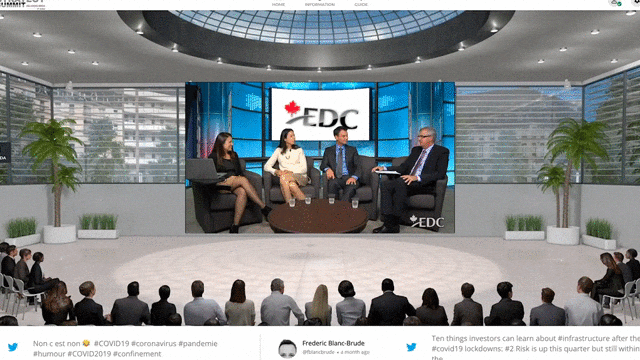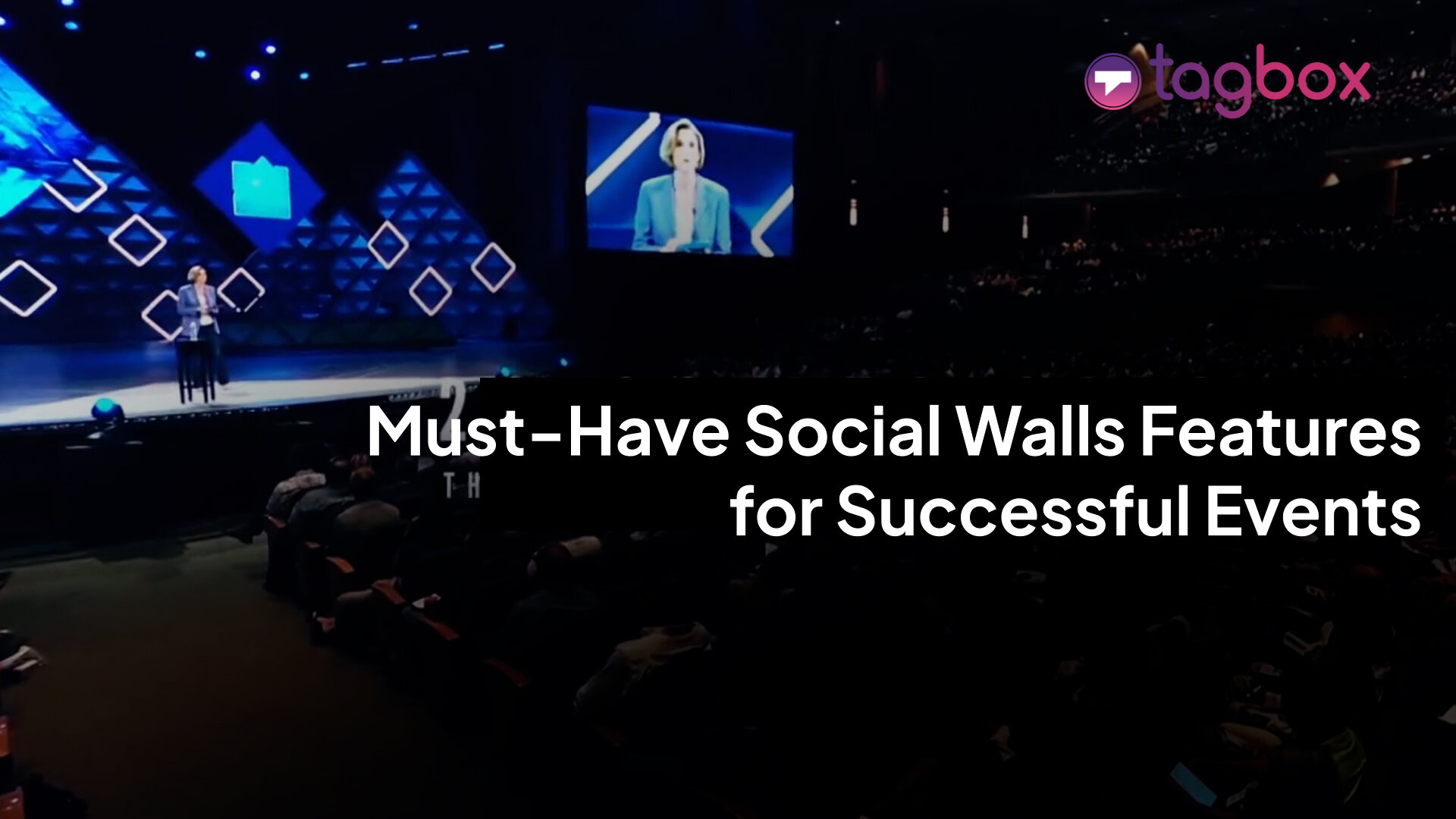Read summarized version with
In-person events? Cool. Virtual events? Borderline essential now. However, virtual event success isn’t just about hopping on Zoom and hitting the “record” button. Therefore, questions like How to host a virtual event, keep bugging the organizers. If you have been in the same boat, you have arrived at the right shore. Let us take a look.
What are Virtual Events?
Virtual events are online gatherings where people interact in a virtual environment on the web, rather than physically meeting. They often involve webinars, live streams, virtual conferences, and other interactive elements.
Difference Between In-Person and Virtual Events
Here is a tabular comparison of in-person and virtual events for a better understanding.
| Aspect | In-person events | Virtual Events |
| Venue | Physical locations (hotels, conference centres) | Online platforms (Google Meet, Zoom, etc) |
| Cost | Higher ( Venue, Travel, Logistics) | Lower (platform subscription, minimal logistics) |
| Accessibility | Limited by location and capacity | Global access, no travel needed |
| Networking | Face-to-face, organic conversations | Chats and breakout rooms |
How To Host a Successful Virtual Event
Take a look at the breakdown of the process of hosting a successful virtual event.
1. Define the Purpose of Your Event
Before diving into how to host virtual events, it’s essential to have a clear vision of how you want it to look. In the process, also determine the format you want to use for hosting a virtual event. Whether it is a virtual conference, virtual and interactive career fair, or just webinars
Here is how you can get started;
- Increase brand awareness for your virtual event.
- Stay in touch with your existing, new, and prospective clients to expand your reach.
- Talk about all the topics that fall under your niche
- Launch e-products related to your virtual hosts
2. Choose the Right Virtual Event Platform
Choosing the correct format and virtual event platform is crucial when determining how to host virtual events.
This helps to keep your audience engaged throughout your virtual event.
Let’s take a look at the breakdown of the right platforms you can use for hosting virtual events in various formats.
| Format | Best for | Tools you can use |
| Webinar | Provide demos, Thought leadership. | Zoom Webinar, Livestorm |
| Live Panels | Expert discussions, trend breakdown | StreamYard, Riverside |
| Virtual Conferences | Multi-track events, B2B expos | Hopin, Airmeet, Vfairs |
| Workshops | Interactive sessions, Training | Zoom, Butter, Luma |
| Social Live Events | Brand Buzz, Influencer collabs | Instagram Live, TikTok Live, Facebook Live |
3. Craft an Engaging Agenda
An engaging agenda is the backbone for the event. It should not be about filling time, but rather keeping attention, delivering value, and leaving the attendees wanting more. For example, if you are hosting an event like BAFTA, your agenda must be to celebrate movies, storytelling, and entertainment. This should be reflected in every part of the agenda, from the opening notes to every session in your virtual events.
Wondering how to begin? Well, design your agenda like a well-paced story. Begin the event with a powerful session and build momentum with interactive activities.
4. Design a Branded Experience
To ensure you leave a lasting impression when hosting a virtual event, design a branded experience that creates a memorable experience.
Your brand should be visible not just in the logo or color scheme, but in the tone of the event, the speaker lineup, the presentation style, and even the way attendees interact. From virtual backgrounds to custom waiting room messages, every touchpoint should feel connected, intentional, and natural.
Another way to create a branded experience for your virtual event is to install a virtual booth. Create a branded template for your virtual photo booth and ask your attendees to take pictures. You can use this content to showcase during your virtual event on the social wall.
5. Test Everything with a Dry Run
Before the big day, it is essential to conduct a thorough rehearsal to ensure a successful virtual event. This includes checking the audio, video, and internet connection. Ensure that the transition between sessions is seamless. You can also explore interactive elements, such as polls, Q&A, and more. It is also wise to have a backup plan in case of technical glitches.
Conducting a dry run across the entire process helps you detect potential glitches and also builds your confidence and preparedness for the upcoming event.
6. Engage Your Audience Live With Taggbox Social Walls

Keep your audience engaged in real-time while hosting a virtual event. With the help of Taggbox Social Wall, you can showcase live shoutouts, reactions, and hashtag campaign right inside your virtual event. Features like SnapUp enable attendees to share their pictures and videos on Taggbox social walls without needing to log in to social media platforms. SnapUp follows a simple two-step process: scan the QR code and upload your content. With this, you can obtain content directly from your audience and showcase it during a virtual event.
This helps organizers create a sense of community for their event, especially when they see their content on social media. Know that networking is essential for any event to be successful.
You can also pair this with various features of Social Walls, such as:
- Live polls with quizzes
- Reaction emojis
- Spotlight
If you’re wondering how to host a successful networking event that truly delivers, combining these features can make it a memorable experience.
Display Real Time Social Content In Your Virtual Events
7. Promote Your Event Effectively
To host a successful virtual event, you need a large audience, which requires a strong promotional strategy. Utilize teaser videos on social media platforms to generate excitement among your target audience. This will give them a sneak peek at what’s to come. You can also send them emails and calendar invites to keep the event top of their mind. Another way to promote your virtual event is to partner with influencers to tap into a new network.

While paid collaborations are effective, do not forget to leverage organic reach on platforms like LinkedIn, Twitter, and others. Utilize tactics such as FOMO, highlight your speaker lineup, exclusive content, and any giveaways. This will help you create a sense of urgency and drive more registrations.
8. Follow Up and Analyze
Do not go silent after the event is over. Your post-event strategy is just as important as your event itself when hosting a virtual event. Send thank-you emails to all your attendees, sponsors, and partners. You can also send out post-event survey forms to gather information on what went well and what could be improved.
You can also delve into the analytics and compare the registration numbers versus the actual numbers. Next, take a look at poll engagement, polls, and reactions. Examine the drop-off points and determine what factors led them away. Use this data to optimize your next event. Remember that your event’s success determines the next event’s sponsors.
Also Read: How to Get Sponsors for an Event: The Complete Guide
Best Virtual Events Examples Across the Globe
Here are some of the best virtual event examples from around the world.
1. Apple’s Worldwide Developers’ Conference

Apple transitioned its annual WWDC into a fully virtual experience that still felt as polished and premium as ever. With high-production keynotes, interactive sessions for developers, and on-demand content.
They didn’t just move online; they optimized the experience for the digital world. This helped them prove that, with proper planning and branding, it is possible to create a global buzz and deliver a valuable event when hosting a virtual event. WWDC 2020 is a brilliant example of how to host a successful virtual event with innovation and user-first design.
2. Salesforce World Tour Sydney

Salesforce is a #1 CRM giant in the tech industry, and holds a conference every year. This event showcases how they empower the world’s leading brands with their innovative solutions, cutting-edge technology, and new products. In 2020, their conference was digital due to the pandemic. However, instead of scaling it down, they doubled down on innovation and demonstrated to the world how to host a successful virtual event.
They built a dedicated landing page that comprises all the recordings of live sessions. This also included detailed schedules, keynote messages, speaker lineups, and interactive elements. The interface was easy to use and ensured that all attendees could access and engage with the content.
3. Billboard’s Live At Home Music Concerts

In 2020, Billboard took a bold step to reimagine the concert experience by launching their Live At Home series. This virtual concert series featured artists such as Nicky Jam, Camilo, Meghan Trainor, and Lukas Graham, among others, performing on sets directly from their homes.
These weren’t just performances; they were personal moments, often coupled with live Q&A sessions that allowed fans to connect with their favorite artists in real time.
Streaming across social media platforms and Billboard’s website, this series is a masterclass on how to host virtual events in the entertainment industry.
This event also demonstrated that with the correct format and digital touchpoints, you can transform living rooms into global stages.
Also Read: Top 20 Event Activation Ideas To Up Your Game in 2025
Key Factors To Consider While Hosting A Virtual Event
Understanding how to host virtual events is more than just picking the right platform. It’s more about designing a comprehensive experience that aligns with the energy and conveys the intended message to the attendees. Consider the following key factors to keep in mind when hosting a virtual event.
Audience Engagement
Virtual event fatigue is real. To avoid this scenario, consider diversifying your content types. Create engaging content such as live Q&A, interactive polls, chat features, and more.
Also Read: Event Gamification: 18 Best Event Gamification Ideas
Technical Reliability
To host a virtual event, a seamless experience is non-negotiable. Your attendees would expect stable streaming and glitch-free transitions; ensure that the event is thoroughly tested throughout.
Clear Communication
Your attendees should never wonder, “What’s next?” Therefore, use timely reminders, calendar invites, and emails to guide them through the experience. Please give them a brochure about what meet-ups they will be attending. This will keep them hooked for the upcoming events.
Time Zones
One of the significant perks of virtual events is flexibility to attend and global accessibility. But that also means planning sessions and replays that accommodate multiple time zones. The best time zone to host virtual events, particularly webinars, is generally considered to be between 11 AM and 2 PM in the audience’s local time zone.
Powerup Your Virtual Events and Live Streaming Sessions
Final Thoughts
It might seem easy to host a virtual event at first. However, this requires patience, strategy, and execution.
From defining the event’s goal to aligning your content and promoting your event, each step plays a crucial role in setting a benchmark for hosting an event. Remember that your virtual event does not stop when the stream ends. You must be vigilant in measuring the impact of your virtual event and utilizing the data for future events.







